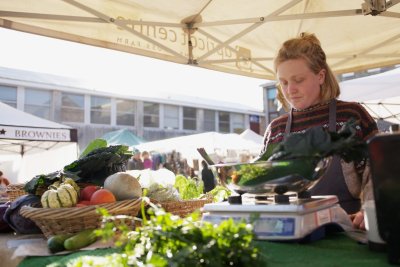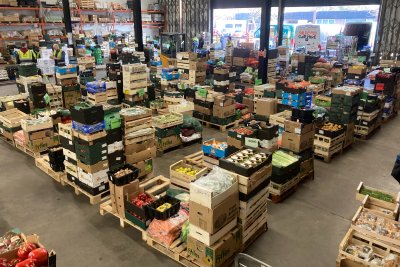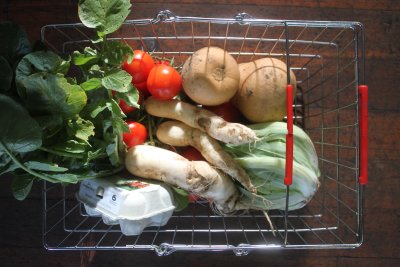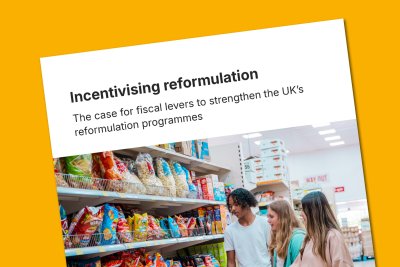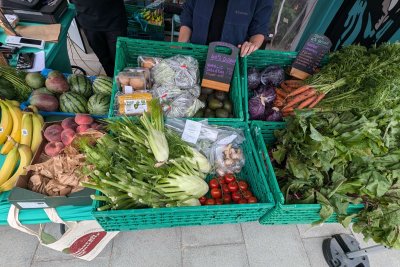 Students being served in school canteen. Copyright: Monkey Business Images | shutterstock
Students being served in school canteen. Copyright: Monkey Business Images | shutterstock
Defra review highlights 'huge' opportunity to improve public food procurement
Sustain welcomes the recommendations in Will Quince MP's independent report to Defra on increasing the social, environmental and economic benefits of public sector food procurement.
An independent review of public food procurement has called for mandatory environmental and nutritional standards to extend across the whole of the public sector, and be properly monitored for compliance. It also calls for an increase in school food funding, and more inclusion of farmers and small and medium enterprises (SME) in being able to access opportunities for supplying food and drink to the public sector.
Responding to the Will Quince review, Sustain's Chief Executive Kath Dalmeny said:
"Every year, billions of pounds are spent purchasing food for our schools, hospitals, prisons, care homes and government departments. This could be supporting sustainable farmers and leading the transition to climate-friendly and healthy diets necessary to protect the climate, restore nature and improve our health. Currently this opportunity is being missed becaue the standards aren't strong enough, aren't legally-binding or monitored, and aren't required across the whole public sector. We urge the new Government to pick up this review's recommendations, and make existing Government Buying Standards mandatory across the whole public sector, backed with proper compliance and funding support, as well as increase funding for school meals to put healthy and sustainable food on children's plates."
Public sector food procurement is worth around £5 billion every year, and has tremendous power to drive sustainable farming, fairer supply chains and deliver healthier, more planet-friendly food in public settings such as schools, hospitals, prisons, care homes and the armed forces. In early 2024, Defra commissioned an independent review to look at:
- How the Government Buying Standards for Food and Catering Services (GBSF) – which set mandatory and good practice standards for public sector food procurement – apply in the public sector, the barriers to use and how to overcome them.
- Opportunities to extend Government Buying Standards, especially to education settings. Education settings spend around 60% of the total £5 billion annual spend on public sector food procurement, so have great potential to help achieve GBSF aims.
- Other schemes and practices that support Government Buying Standards aims and increase accessibility of public sector procurement to SMEs and farmers.
The review was led by Will Quince MP, who has held ministerial roles in the Department for Education, Work and Pensions, and Health and Social Care before stepping down as a Member of Parliament before the 2024 General Election.
Read the full Will Quince report: Independent Review into Public Sector Food Procurement, May 2024
The 23-page report recognises that at present Government Buying Standards for Food and Catering Services (GBSF) set out mandatory and 'best practice' standards on production, processing and nutrition for central Government departments, the NHS, prison and probation services, but are not mandatory in other public settings such as education settings or care homes. There are also other standards - such as the School Food Standards - that apply to nutritional aspects, but do not extend to fair trading, environment, animal welfare or sustainable fish. The report calls for standards to be unified and mandatory across the whole of the public sector.
Ruth Westcott, Campaign Manager for the Climate and Nature Emergency said:
"These recommendations are great as far as they go - but they aren't enough to ensure we get the healthy and sustainable public sector food we need. The Government Buying Standards themselves need to be stronger, clear, and legally-binding. A particularly pressing problem is that public meals aren't currently required to reflect UK greenhouse gas emissions reductions targets, nor that higher-standard UK produce must be sourced. We know that great healthy and sustainable school and hospital food is possible and brings a host of benefits, and many fantastic examples were highlighted in the Will Quince report. We now need to see this issue top of the priority list for the new Government."
The report also highlights the absence of official compliance or monitoring of standards, resulting in limited evidence of their reach and effectiveness. It recognises barriers to compliance, from lack of awareness to lack of incentives to comply.
The report also contains a powerful endorsement of the useful role being played by the Soil Association's Food For Life programme, currently operating in around 25% of English primary schools, 50 NHS hospitals and over 50 universities, serving around 2 million accredited meals every day.
The role of SMEs and the power of procurement from local and sustainable sources is a further theme reflected in the report. Sustain's Bridging the Gap programme is currently piloting different approaches to get British organic produce into school food, for example. The report urges Government to support and champion mechanisms to enable smaller producers to access tender processes, such as dynamic procurement platforms.
Recommendations in the report include:
- Unify and mandate standards across the whole of the public sector
- Publish the response to the 2022 consultation on the GBSF, and an updated set of standards
- Encourage innovation and uptake of best practice in procurement - including assurance schemes tailored to each sector, and providing funding to support schools with Food For Life accreditation, as is already the case in Scotland
- Establish clear metrics for assessing compliance with standards, build baseline data and create strong reporting mechanisms
- Improve accessibility to public procurement for SMEs, farmers; create a government support service to suppor them as well as public sector caterers and procurers and set targets for spend on SMEs and farmers.
- Review the procurement approach for the School Fruit and Vegetable Scheme to maximise access for SMEs and farmers.
- Provide grant funding for local collaborations between farmers and local procurers
- Ensure school food quality by increasing the school meal allowance to reflect inflation, and ensuring ringfencing of school food budgets.
Sustain is calling for all political parties to commit to harnessing the power of public sector food, for people and planet. All the major parties have made some commitments to sourcing local and sustainable food, including the Conservative Party, the Liberal Democrats and Labour, who have all promised to source at least 50% 'local or sustainable' food for the public sector.
Food for the Planet: Helping local authorities to tackle the climate and nature emergency through food.
Sustain
The Green House
244-254 Cambridge Heath Road
London E2 9DA
020 3559 6777
sustain@sustainweb.org
Sustain advocates food and agriculture policies and practices that enhance the health and welfare of people and animals, improve the working and living environment, promote equity and enrich society and culture.
© Sustain 2025
Registered charity (no. 1018643)
Data privacy & cookies
Icons by Icons8

